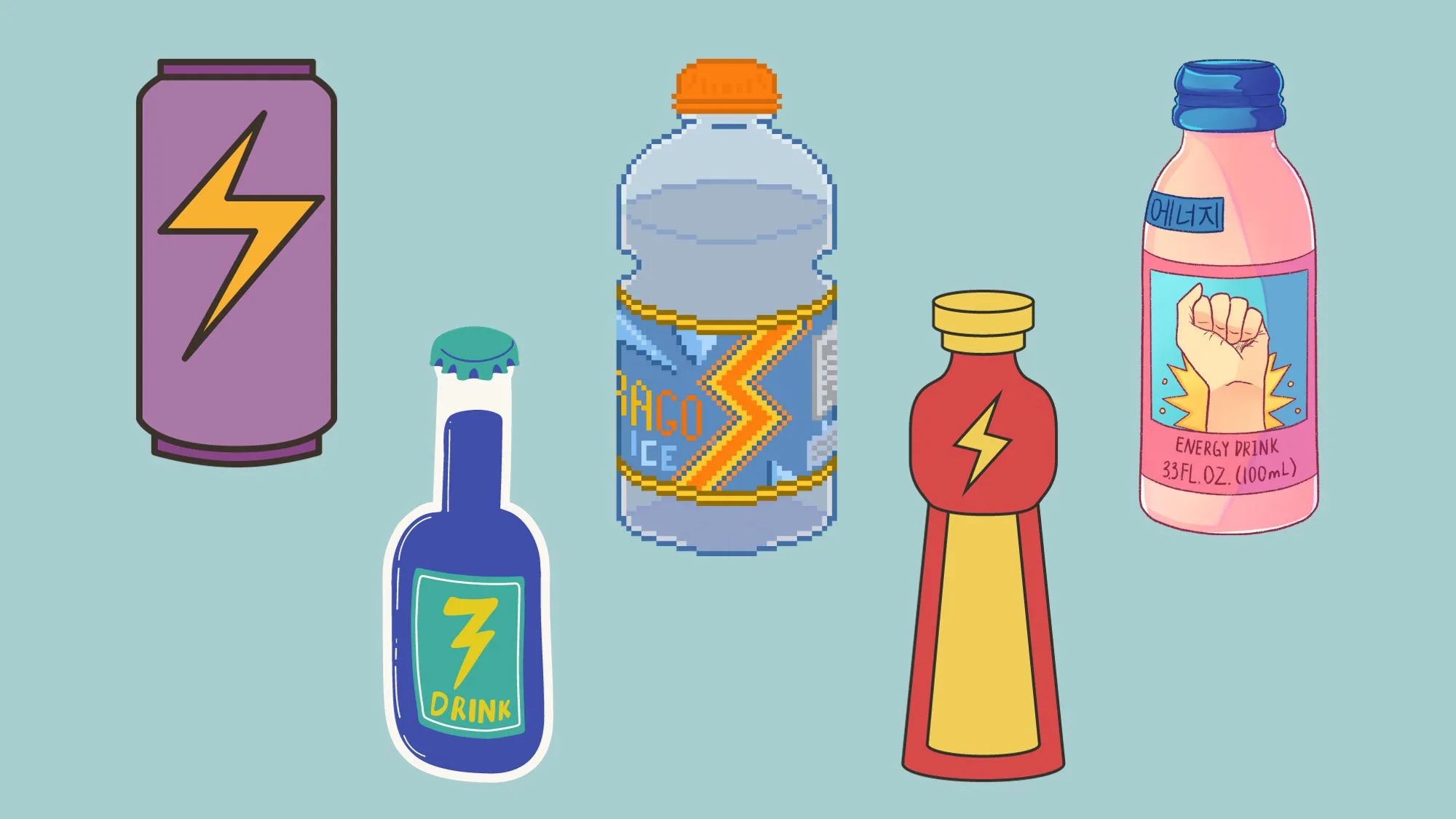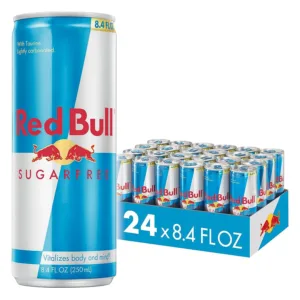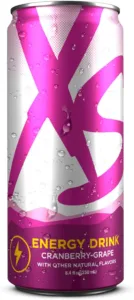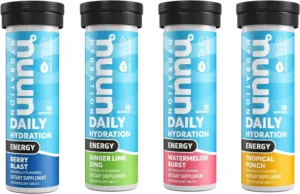
Living with ADHD can present unique challenges, especially when it comes to maintaining focus and productivity. Thankfully, there are strategies and solutions available to help manage these difficulties. One option that many individuals with ADHD consider is turning to energy drinks. These beverages are widely known for their ability to provide a quick boost of energy and enhanced alertness. However, not all energy drinks are created equal, and understanding their impact on ADHD symptoms is crucial in making an informed choice. In this article, we will explore the science behind ADHD and its effects on focus and productivity, the role of nutrition in managing ADHD, the pros and cons of energy drinks for ADHD, as well as safety considerations when using these beverages. You will also find valuable tips on how to engage in self-care for ADHD, empowering you to make the best choices for your overall well-being.
Top 3 Best Energy Drink for ADHD
- XS Energy Drink. Indulge in the irresistible XS Cranberry-Grape Blast, a sugar-free sensation that harmonizes the sweet notes of grape with the invigorating burst of cranberry. This exclusive AMWAY energy drink not only delights your taste buds but also offers a powerful punch of B vitamins and caffeine for guilt-free, on-the-go energy. With zero sugar, minimal calories (just 10 per can), and a kosher-certified blend of premium ingredients, herbs, and B vitamins, XS Cranberry-Grape Blast is your ticket to a revitalizing treat. Conveniently packaged in single-serve cans, it’s the perfect companion for those seeking a delicious and energizing boost anytime, anywhere.
- Red Bull Sugar Free Energy Drink. A guilt-free twist on the iconic energy drink. Crafted with Red Bull’s signature blend of caffeine, taurine, and B-group vitamins, this sugar-free variant delivers a refreshing boost without the added calories. With 80 mg of caffeine per serving, it matches the energy of a home-brewed coffee. Wheat-free, dairy-free, lactose-free, gluten-free, vegetarian, and non-alcoholic, Red Bull Sugar Free offers a versatile and satisfying experience straight from the can or over ice. Ideal for the calorie-conscious and diabetics, it’s the perfect choice for a crisp and energizing sip.
 Red Bull Sugar Free Energy Drink
Red Bull Sugar Free Energy Drink
- Nuun Energy. Elevate your hydration experience with Nuun Energy, the effervescent energizing drink tablet designed for a clean and invigorating boost. Packed with organic Green Tea extract, essential electrolytes, and a fusion of Panax Ginseng and B vitamins, Nuun Energy is the ideal alternative to conventional energy drinks. This gluten-free, soy-free, dairy-free, vegan, kosher, and non-GMO certified formula is crafted with plant-based ingredients, ensuring a wholesome sip. With only 2g of sugar and a commitment to no artificial ingredients, flavors, or colors, Nuun Energy offers a refreshing and guilt-free hydration solution.
Understanding ADHD and Its Impact on Focus and Productivity
ADHD, or Attention Deficit Hyperactivity Disorder, is a neurodevelopmental disorder characterized by persistent patterns of inattention, impulsivity, and hyperactivity. While ADHD affects individuals differently, one common challenge is maintaining focus and productivity in daily life. The brain’s executive functions, responsible for attention, working memory, and self-control, are impaired in individuals with ADHD. Without effective strategies and support, individuals with ADHD may struggle to stay on task, complete assignments, or meet deadlines.
The Science Behind ADHD
Researchers have identified several factors that contribute to the development of ADHD. These include genetic predisposition, brain structure differences, and neurotransmitter imbalances. Dopamine, a neurotransmitter responsible for regulating motivation and reward systems, plays a key role in ADHD. In individuals with ADHD, dopamine levels are often lower than average, affecting attention, motivation, and impulse control.
ADHD and the Struggle with Focus and Productivity
Individuals with ADHD frequently experience difficulties in maintaining focus and productivity due to their unique neurobiological makeup. Distractions can easily interrupt their train of thought, leading to reduced efficiency and increased frustration. Moreover, difficulties with organization, prioritization, and time management can make it challenging to stay on top of tasks and responsibilities. As a result, individuals with ADHD may feel overwhelmed by their daily obligations.
One aspect of ADHD that contributes to the struggle with focus and productivity is the constant bombardment of stimuli that individuals with ADHD experience. Their brains are wired to be highly sensitive to external stimuli, making it difficult to filter out irrelevant information and stay focused on the task at hand. Imagine trying to concentrate on a task while your brain is constantly picking up on every sound, movement, or visual stimulus in your environment. It’s like trying to read a book in a crowded and noisy coffee shop.
Another challenge for individuals with ADHD is the difficulty in regulating their emotions. ADHD is often accompanied by emotional dysregulation, which means that individuals with ADHD may have difficulty managing their emotions and reactions to various situations. This can further impact their ability to stay focused and productive, as they may become easily overwhelmed or frustrated when faced with challenging tasks or unexpected changes.
Effective Functions to Help Individuals with ADHD
The executive functions that are impaired in individuals with ADHD are crucial for effective planning and organization. These functions help individuals prioritize tasks, break them down into manageable steps, and allocate their time and resources accordingly. Without these skills, individuals with ADHD may struggle to create a structured routine or develop effective strategies for managing their workload. This can lead to a constant feeling of being overwhelmed and falling behind, further impacting their focus and productivity.
It’s important to note that while ADHD can present significant challenges, individuals with ADHD also possess unique strengths. Many individuals with ADHD are highly creative, innovative, and have the ability to think outside the box. Their hyperactive minds often allow them to make connections and see patterns that others may miss. By harnessing these strengths and implementing strategies tailored to their specific needs, individuals with ADHD can overcome the challenges they face and thrive in various areas of their lives.
The Role of Nutrition in Managing ADHD
While medication and therapy are commonly used to manage ADHD symptoms, nutrition plays an important role in overall well-being and can have a significant impact on ADHD symptoms. By providing the body with essential nutrients, individuals with ADHD can support brain health and optimize cognitive function.
When it comes to managing ADHD, a holistic approach is often recommended. This means considering not only medication and therapy but also lifestyle factors, including nutrition. A well-balanced diet rich in essential nutrients can be particularly beneficial for individuals with ADHD, as it can help address underlying imbalances and support optimal brain function.
Essential Nutrients for ADHD
A well-balanced diet is important for everyone, but it can be especially crucial for individuals with ADHD. Some nutrients have been linked to improved focus and attention, making them particularly important for those managing ADHD symptoms.
One such nutrient is omega-3 fatty acids, which are found in fatty fish such as salmon, mackerel, and sardines. These fatty acids are essential for brain health and have been shown to support cognitive function. Including these types of fish in the diet can help individuals with ADHD meet their omega-3 fatty acid needs.
Iron is another important nutrient for individuals with ADHD. Iron deficiency has been associated with cognitive impairments, including poor attention and decreased cognitive performance. Including iron-rich foods such as lean meats, beans, and fortified cereals can help ensure individuals with ADHD are getting enough of this essential mineral.
Zinc is yet another nutrient that plays a role in cognitive function and may be beneficial for individuals with ADHD. Research suggests that zinc supplementation may improve symptoms of hyperactivity and impulsivity in children with ADHD. Foods rich in zinc include oysters, beef, pumpkin seeds, and spinach.
Magnesium is a mineral that supports nerve function and has been linked to improved attention and focus. Including foods such as almonds, cashews, spinach, and whole grains can help individuals with ADHD meet their magnesium needs.
B vitamins, including B6 and B12, are also important for brain health and cognitive function. These vitamins play a role in neurotransmitter synthesis, which is crucial for proper brain function. Foods rich in B vitamins include meat, fish, eggs, legumes, and dark leafy greens.
The Connection Between Diet and ADHD Symptoms
While a well-balanced diet can provide essential nutrients that support brain health and cognitive function, certain dietary factors may worsen ADHD symptoms in some individuals. It is important to note that the relationship between diet and ADHD symptoms is complex and may vary from person to person.
One factor that has been implicated in exacerbating hyperactivity and inattention in some individuals with ADHD is sugar. While sugar does not cause ADHD, it may contribute to increased impulsivity and difficulty with focus and attention. Limiting the intake of sugary foods and beverages may be beneficial for individuals with ADHD.
In addition to sugar, artificial food additives, food colorings, and preservatives have also been suggested to worsen ADHD symptoms in some individuals. While more research is needed to fully understand the impact of these additives on ADHD, it may be worth exploring whether certain dietary modifications, such as avoiding foods with artificial additives and colorings, can be helpful for managing symptoms.
It is important to remember that while nutrition can play a role in managing ADHD symptoms, it is not a substitute for medication or therapy. A comprehensive treatment plan that includes a balanced diet, medication, therapy, and other lifestyle factors is often recommended for individuals with ADHD.
Energy Drinks and ADHD: A Comprehensive Overview
Energy drinks have gained popularity among individuals looking for a quick energy boost. These beverages typically contain high levels of caffeine, sugar, and other ingredients that stimulate the central nervous system. While energy drinks may provide a temporary increase in alertness, it is essential to understand their potential impact on ADHD symptoms.
ADHD, or Attention-Deficit/Hyperactivity Disorder, is a neurodevelopmental disorder characterized by symptoms such as inattention, hyperactivity, and impulsivity. Managing ADHD symptoms can be challenging, and individuals with ADHD often seek strategies to improve focus and productivity.
What Makes an Energy Drink?
Energy drinks often contain caffeine, taurine, B-vitamins, and other ingredients known for their stimulant properties. These components work together to provide a rapid increase in energy and improved mental focus. Caffeine, in particular, acts as a central nervous system stimulant, increasing alertness and reducing fatigue. Taurine, an amino acid, has been suggested to enhance cognitive performance and reduce mental fatigue. B-vitamins, such as B6 and B12, play a crucial role in energy metabolism and brain function.
However, it is important to note that the exact formulations of energy drinks can vary significantly, and not all products are suitable for individuals with ADHD. Some energy drinks may contain excessive amounts of caffeine, which can have adverse effects on individuals with ADHD.
The Pros and Cons of Energy Drinks for ADHD
Energy drinks can offer some benefits for individuals with ADHD. Such as increased alertness, improved cognitive function, and enhanced task performance. The stimulant properties of energy drinks can help individuals with ADHD overcome feelings of sluggishness. It also improve their ability to concentrate on tasks.
However, it is crucial to approach energy drink consumption with caution. The high caffeine content in these beverages can lead to jitteriness, increased heart rate, and disrupted sleep patterns – all side effects that can worsen ADHD symptoms. Caffeine sensitivity varies among individuals, and some people with ADHD may be more susceptible to its negative effects.
Furthermore, the sugar content in many energy drinks may contribute to fluctuations in blood sugar levels, leading to decreased focus and concentration. While the initial sugar rush may provide a temporary boost in energy, the subsequent crash can leave individuals feeling even more fatigued and mentally drained.
It is essential to weigh the potential benefits against the possible negative effects before incorporating energy drinks into your routine. Consulting with a healthcare professional, such as a doctor or nutritionist, can provide personalized guidance on whether energy drinks are suitable for managing ADHD symptoms.
Energy drinks can provide a temporary energy boost and improved cognitive function for individuals with ADHD. However, the high caffeine and sugar content in these beverages can have adverse effects on ADHD symptoms, such as increased restlessness and decreased focus. It is crucial to consider individual sensitivities and consult with a healthcare professional before incorporating energy drinks into an ADHD management plan.
Evaluating the Best Energy Drinks for ADHD
When considering energy drinks as a potential option for managing ADHD symptoms, it is essential to choose products that prioritize safety and effectiveness. By understanding key ingredients and decoding energy drink terminology, you can make informed decisions that align with your specific needs.
Key Ingredients to Look For
When selecting energy drinks, prioritize those that contain nutrients known to support cognitive function, such as B-vitamins and L-theanine. These ingredients can provide a more balanced boost of energy without some of the negative side effects associated with high caffeine content.
Understanding the Labels: Decoding Energy Drink Terminology
Energy drink labels can be confusing, with industry-specific jargon and marketing buzzwords. Take the time to read and understand the labels before making a purchase. Look for keywords that indicate lower or moderate caffeine content, the absence of artificial additives or excessive sugar, and certifications that attest to the product’s quality and safety.
Safety Considerations When Using Energy Drinks for ADHD
While energy drinks can offer potential benefits, it is essential to prioritize safety when incorporating them into your routine. Understanding potential side effects and risks, as well as following best practices for consumption, can help you make informed choices that support your overall well-being.
Potential Side Effects and Risks
Excessive consumption of energy drinks can lead to an array of side effects. Including increased heart rate, elevated blood pressure, digestive issues, and sleep disturbances – all of which can exacerbate ADHD symptoms. Additionally, it combines energy drinks with certain medications. Including those used to manage ADHD, can be dangerous. It is crucial to be aware of the potential risks. Consult with a healthcare professional if you have any concerns.
Tips for Safe Consumption of Energy Drinks
- Limit your consumption. Moderation is key when it comes to energy drinks. Limit your intake to one or two servings per day. Avoid consuming them late in the day to prevent disruption of your sleep patterns.
- Stay hydrated. Since energy drinks can be dehydrating, be sure to drink plenty of water throughout the day to maintain optimal hydration.
- Read the labels carefully. Look for energy drinks that are low in sugar, artificial additives, and excessive caffeine.
- Consider alternative options. If energy drinks are not the right fit for you, explore other strategies for managing ADHD symptoms. Such as lifestyle modifications, therapy, or alternative supplements.
Finding the best energy drink for ADHD requires careful consideration and awareness of your specific needs. While energy drinks can offer a quick boost of energy and improved focus, it is essential to understand their potential impact and prioritize safety. By incorporating a well-balanced diet, exploring alternative strategies for managing ADHD symptoms, and making informed choices when it comes to energy drinks. You can find a routine that boosts your focus. As well as productivity while supporting your overall well-being.
Using CareClinic App to Enhance Focus and Productivity
As you navigate the complexities of managing ADHD and enhancing your focus and productivity, consider integrating the CareClinic App into your daily routine. This comprehensive health app is designed to help you track your symptoms, dietary intake, and the effectiveness of different treatments. Including the use of energy drinks. With features like medication reminders, mood tracking, and progress reports, the CareClinic App enables you to monitor how certain strategies impact your ADHD symptoms. By analyzing this data, you can make informed decisions about what works best for you. Experience the benefits of personalized health management by installing the CareClinic App today. Take the first step towards improved health outcomes.

 XS Energy Drink
XS Energy Drink Nuun Energy
Nuun Energy
